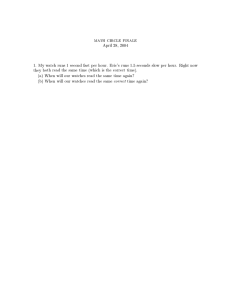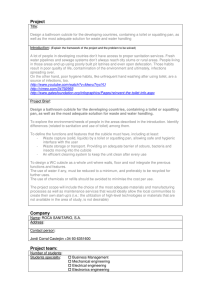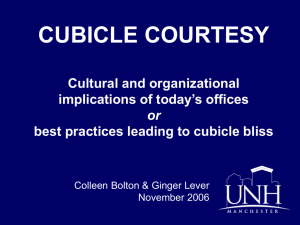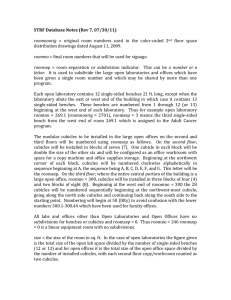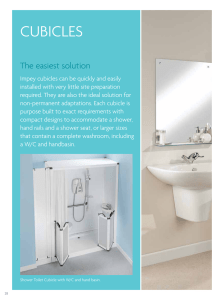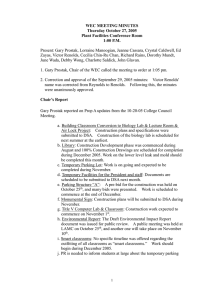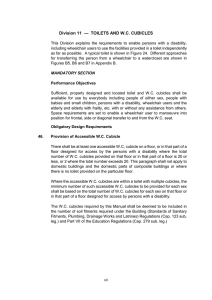Avoiding Cubicle Wars: How to Help Employees Co-Exist in Tight... By Andrea C. Poe
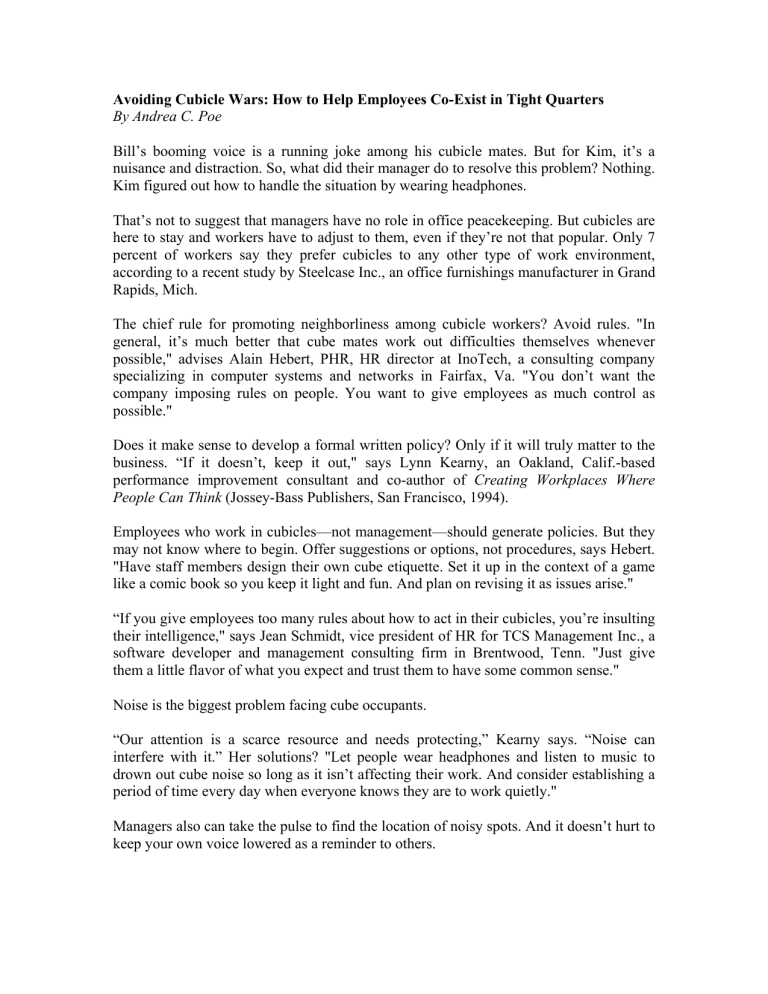
Avoiding Cubicle Wars: How to Help Employees Co-Exist in Tight Quarters
By Andrea C. Poe
Bill’s booming voice is a running joke among his cubicle mates. But for Kim, it’s a nuisance and distraction. So, what did their manager do to resolve this problem? Nothing.
Kim figured out how to handle the situation by wearing headphones.
That’s not to suggest that managers have no role in office peacekeeping. But cubicles are here to stay and workers have to adjust to them, even if they’re not that popular. Only 7 percent of workers say they prefer cubicles to any other type of work environment, according to a recent study by Steelcase Inc., an office furnishings manufacturer in Grand
Rapids, Mich.
The chief rule for promoting neighborliness among cubicle workers? Avoid rules. "In general, it’s much better that cube mates work out difficulties themselves whenever possible," advises Alain Hebert, PHR, HR director at InoTech, a consulting company specializing in computer systems and networks in Fairfax, Va. "You don’t want the company imposing rules on people. You want to give employees as much control as possible."
Does it make sense to develop a formal written policy? Only if it will truly matter to the business. “If it doesn’t, keep it out," says Lynn Kearny, an Oakland, Calif.-based performance improvement consultant and co-author of Creating Workplaces Where
People Can Think (Jossey-Bass Publishers, San Francisco, 1994).
Employees who work in cubicles—not management—should generate policies. But they may not know where to begin. Offer suggestions or options, not procedures, says Hebert.
"Have staff members design their own cube etiquette. Set it up in the context of a game like a comic book so you keep it light and fun. And plan on revising it as issues arise."
“If you give employees too many rules about how to act in their cubicles, you’re insulting their intelligence," says Jean Schmidt, vice president of HR for TCS Management Inc., a software developer and management consulting firm in Brentwood, Tenn. "Just give them a little flavor of what you expect and trust them to have some common sense."
Noise is the biggest problem facing cube occupants.
“Our attention is a scarce resource and needs protecting,” Kearny says. “Noise can interfere with it.” Her solutions? "Let people wear headphones and listen to music to drown out cube noise so long as it isn’t affecting their work. And consider establishing a period of time every day when everyone knows they are to work quietly."
Managers also can take the pulse to find the location of noisy spots. And it doesn’t hurt to keep your own voice lowered as a reminder to others.
Another solution: Provide private spaces with telephones. A small room with a phone or even a reconstituted phone booth—with a regular office phone, not a pay phone--can do the trick.
For meetings, managers should make sure that conference rooms provide real privacy, with doors and solid walls. These rooms also can help when people need to discuss sensitive or confidential matters. Just be careful not to use a conference room for every reprimand or a closed door will come to signal trouble.
You also can help employees make their cubicles places where they can work without fear of constant interruption. One company’s solution: yellow police tape to stretch across a cubicle entrance. Functioning doorbells or “Open” and “Closed” signs also work.
Another tool is a system of colored flags that workers can hang above their cubicle and that are visible around the room, says Mark Gorkin, a Washington, D.C.-based psychologist and the creator of StressDoc.com, a web site that deals with workplace stress issues.
If all else fails, be prepared to move workers. A data-entry person who doesn’t need full attention for her work may actually be happier in a noisier cubicle near more activity.
Conversely, an analyst requiring intense concentration is likely to need a quiet spot.
And remember that some people have low ability to tune out distractions, regardless of their work. Others are “high screeners”--they could work on a folding chair in Grand
Central Station, says Kearny.
Andrea C. Poe is a freelance writer based in Annapolis, Md., who specializes in human resource and management issues.
©2000 Society for Human Resource Management. Members of SHRM are authorized to distribute copies, excerpts or e-mails of this information for educational purposes internally within their organization. No other republication or external use is allowed without permission of SHRM. The information is not intended to serve as a substitute for legal advice.
